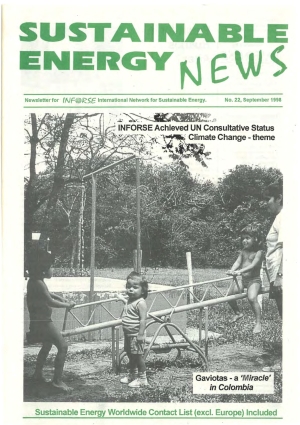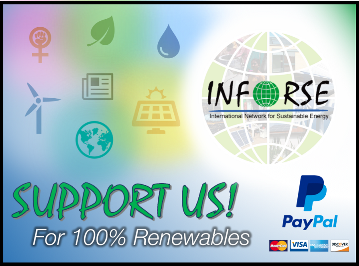|
|
|
|
|
|
|
|
|
|
|
|
|
|
|
|
|
|
|
|
|
| Follow Us: |
| Fresh Air in Buenos Aires? | |

| |
| There are many concerns that should be addressed while our common climate is high on the global agenda in the first two weeks of November, at the 4th Conference Of the Parties to the Climate Convention (COP4). One overriding concern is that man-made CO2 emissions continue to increase year by year, despite nearly a decade of global climate-change discussions. | |
| One critical area is whether and how the different means for CO2 accounting, trading, and reduction that were decided in principle during COP3 in Kyoto are made operational. There is a high risk that attention will be concentrated on technical details of hot-air trading and loop-holes, that basically will lead to nowhere, and will divert the attention from the necessary dramatic cuts in emission of greenhouse gases, first of all in industrialised countries. Among the ‘Kyoto-tools’ are Activities Implemented Jointly (AIJ) and the Clean Development Mechanism (CDM). Both implies that investments in CO2 reductions in another country can substitute reductions in the investing country. While AIJ will be organised among Annex-1 (industrialised) countries, the CDM will be arranged between Annex-1 and Non-Annex-1 countries. One issue will be how to account properly for these CO2 reductions, both on the ‘buying’ and on the ‘selling’ end. Another issue, maybe even more crucial, is how to ensure that, e.g., CDM investments in a developing country are supporting local development goals, not an agenda decided elsewhere. Another issue to look for at COP4 is the nature of investments in CO2 reductions. On the electricity production side, there is a trend to look for large, centralised solutions involving, e.g., nuclear power, large hydro schemes, and more efficient use of fossil fuels by power stations, whereas the potential of renewable sources of energy in general is overlooked. This is despite the fact that grid-connected renewable sources of energy have proven to be a cost-efficient means for CO2 reduction in many countries, and that renewable energy holds a large promise for CO2-neutral supply of energy to billions of people living in remote off-grid areas. And again, the key role of local actors such as municipalities, companies, and community organisations in creating a base for sustainable energy development is likely to be overlooked in the quest for central, easy-looking, and presumably ‘efficient’ solutions. The sustainable energy agenda for COP4 should promote initiatives for energy conservation and renewable energy, and should work for strong local involvement in planning, decision making, and implementation of CO2 reduction. And adding to this, the benefits of clean air, energy independence, and job creation could provide some much-needed fresh optimism in the climate talks. | |

| |
| Published in Sustainable Energy News |
|
|
Go back to main page of ISSUE #22, Sustainable Energy News (16 pages) (1998-09-01) |
|
| Contact | |
| |
INFORSE Secretariat Klosterport 4F, 1. floor DK-8000 Aarhus C Denmark Phone: +45 86 22 70 00 Twitter: INFORSE_org Facebook: INFORSE Web: inforse.org E-mail: ove@inforse.org |
